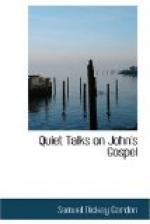And as the incoming crowds thicken for the Passover, and the talk about Lazarus is on every tongue, it is determined to put Lazarus to death, too. This is the pitch things have risen to as John brings this part of his story to a close.
The Glory-Coloured Thread.
It is a relief to turn now to the chief figure in this tapestried picture of John’s weaving. Here are glory-coloured threads of bright yellow. They easily stand out, thrown in relief both by the pleasing blues and the disturbing blacks. It is the figure of the Man on the errand, intent on His wooing, absorbed in His great task. Thia Man, His tremendous wooing, wins glad grateful ever-growing acceptance. And with rarest boldness and courage He persists in His wooing in spite of the terrific intensifying opposition.
The gentle softening dew persists in distilling even on the hardest stoniest soil. The gentle winsomeness of the wooing stands out appealingly as one goes through those fragments of teaching talks running throughout. The rare faithfulness of it to the nation and its leaders is thrown into bold relief by the very opposition that reveals their dire spiritual plight and their sore need.
The power of it is simply stupendous. As gentle in action as the falling dew it grows in intensity until neither the gates of death nor even the stubborn resistance of a human will can prevail against it. It is power sufficient to satisfy the most critical search, and to make acceptance not only possible with one’s reasoning power in fullest exercise but the rational thing.
Look a bit at the power at work here. For in looking at the power we are getting a better look at the Man, and at the purpose that grips Him. Of the nineteen incidents in these twelve chapters fifteen give exhibitions of power. It is of two sorts, power over the human will, and miraculous power.
Eight incidents reveal power working upon the human will. In three of these—Nicodemus, the Samaritan woman, the accused sinful woman—the will becomes pliant and is radically changed, so morally affecting the whole life. In five—the temple cleansing, at the Tabernacles Feast, the first and second attempt at stoning, and the kingly entry into the city—the human will is stubbornly aggressively antagonistic to Jesus, but is absolutely restrained from what it is fully set upon doing.
In the other seven incidents the power is miraculous or supernatural. In three—turning the water into wine, multiplying food supplies, walking on the water—it is power in the realm of nature. In four—healing the Roman nobleman’s son, the thirty-eight-year infirmity, giving sight to the man born blind, and the raising of Lazarus—it is power in the realm of the body, radically changing its conditions.




